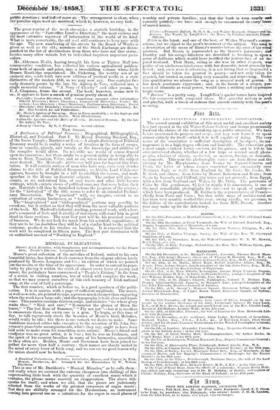MUSICAL PUBLICATIONS.
Moore's Irish Melodies, nub Symphonies and Accompaniments for the Piano- forte. People's Edidon. Longman and Co.
Moore's great collection of the melodies of Ireland, united to his own beautiful lyrics, has derived fresh currency from the elegant edition lately produced by Messrs. Longman and Co. ; an edition of which we pointed out the merits at the time of its appearance. In order to extend its popu- larity by placing it within the reach of almost every lover of poetry and music, the publishers have commenced a " People's Edition," in the form of a serial, in shilling numbers, ten of which will complete the work ; so that we may possess ourselves of this rich treasury of Irish national song, at the cost of half a sovereign.
The first number, which is before us, is a good specimen of the publi • cation. It is in quarto, with a page of sufficient amplitude. The music, as well as words, are printed in type, a process much cheaper than engraving when the work has a large sale ' • and the typography is both clear and hand- some. This number contains thirteen songs, and includes "Go where glory waits thee," "Rich and rare," "Remember the glories of Brien the brave," "The last Rose of Summer," "Fly not yet"—but it is needless to enumerate them, for every one is a gem. To begin, at this time of day, to talk rapturously about the beauties of Moore's Irish Melodies, would really be idle ; but there is one remark we desire to make. Some fastidious musical critics take exception to the retention of Sir John Ste- venson's pianoforte accompaniments, which they say, ought to have been laid aside to make room for something more artistic. Moore's friend and coadjutor was no great artist, it is true ; but he was an Irishman, and the spirit of his country breathes in many of his harmonies, unartificial as they often are. Besides, Moore and Stevenson have been joined to- gether for more than half a century : their names are closely united in the mind of every lover of Irish song, and we can see no good reason why the union should now be broken.
A Hundred Voluntaries, Preludes, Interludes, Hymns, and Fugues, by Rink, Mozart, Beethoven, &c. Arranged for the Harmonium by W. Wilson. Davidson.
This is one of Mr. Davidson's "Musical Miracles," as he calls them and really when we contrast the extreme cheapness (one shilling) of this unpretending little book with the quantity of excellent music which it contains, the phrase seems scarcely an exaggeration. The above title speaks for itself; and when we add, that the pieces are judiciously selected from the works of the greatest composers of organ music ; that they are skilfully arranged for the Harmonium, an instrument coming into general use as a snbstitnte for the organ in small places of
Worship and -private families ;' andlhat-Itheelbook is very nestlyrmatt correctly pririfedi—we have said enough.to•,meommend to everyilltasteri
of sacred:music- .' • . • ,
; a Dramatic Ballad. By IL. S. K., and Walter Mayuanl. Cramer stakCja. Beware. The Words by Longfenow ; the Music by Caroline Adelaide pfTer. 011ivier.
Rime is the latest, and one of the best, of Welter Maynani's eortipn- sitions, but we object to theamees treatment of the subject. The-sang is■ a description of the 'scene of Riariehtmiurder before the eyes of hisTayst mistress: But Rizzi° is represented as the queen's paramour; and' Iferriley and his savage followers are :deseribed as breaking in upotea scene of dalliance which would have justified .the jealous fury of Ail iita- kind husband. That Mary, erring as she was in other respects, War guilty of an adulterous intercourse with her domestic, is not generally tiefa.. lieved : and, even were it otherwise, it is not fitting that so disgraceful a fact should be taken for granted in poetry—and not enly taken , for granted, but•treated nasometbing very romantic and-interesting. Under this qualification we admire the song as a musical work of genius, It has much passionate expression ; and, in the hands of a singer; pos- sessed of dramatic as voCal power, would form a striking and impressive tragic scene. " Peirare" is'a pretty song. ,Longfellow's quaint verses have inspired the fair composer with congenial ideas. IIer graceful melody is arch and playful, with a touch of sadness that accords entirely with theapeers meaning.


























 Previous page
Previous page